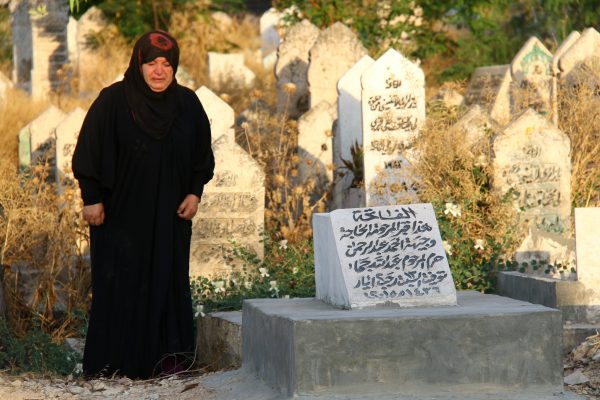I Live to Say Goodbye to Those I Love

A mother visiting the grave of her son who was killed in an air raid in 2015. Photo by: Mujahid Abu al-Jud
Our suffering began the moment my son Qutaiba was arrested in his army barracks almost six years ago, at the beginning of the revolution. The regime thought he was planning to defect.
The news of his arrest came as a great shock to me. We couldn’t find out any more information about him, despite our repeated attempts. We paid large sums of money to some intermediaries hoping to be able to visit him or at least find out in which branch of the security services he was being held, but in vain.
Then came another shock: the arrest of my eldest son Hussein, whose fate seemed to follow that of his brother Qutaiba. After this, my husband Abu Hussein’s health deteriorated dramatically.
Hussein spent several months in prison before being released. But he was a different person. He was skinny, his health was bad and the effects of torture on his body were clear. He thought constantly of prison, recalling how they tortured him, and repeated, “God help my brother and other detainees get out of prison. I’ve been there and I know what it means to be held in a regime prison.”
After a while, Hussein went to visit our relatives in Raqqa. So my poor son escaped Assad’s prison only to be trapped by Islamic State (IS). There was no way of seeing him again, he was trapped and could not leave al-Tabqah, where he ended up living.
My husband was very attached to Hussein. He was so sad for him and his brother Qutaiba. He became bedridden and passed away after a severe illness which exhausted his frail body. He died before he could see his sons again and his last words were, “Hussein and Qutaiba.”
My husband’s parting hurt me and life was very difficult. I felt then that I was alone. Worries filled my heart and I there was no one to share them with. Abu Hussein had been my companion, we had shared the worries. He was a loving father to our children, but these are only memories now.
And the torture did not end. Two months later, Russian aircraft fired missiles at schools in our town, Hass. It became known as the massacre of pens.
The rockets killed more than 50 people, innocent children and teachers who had dedicated themselves to teaching future generations.
My granddaughters Beesan and Aya were among the martyrs.
Beesan, that flower, the daughter of my son Khaled. She was conceived via IVF after my son and his wife had been married for ten years. She was an only child, studying in fourth grade. My son and his wife were so happy with her, the house was flooded with joy and there was always a smile on her soft, innocent face.
Beesan died, leaving grief and pain behind.
She took with her Aya, her uncle Ahmed’s daughter, her companion in both life and death. My granddaughters Beesan and Aya, martyred in a massacre.
Ten days later, a new tragedy hit me: the news of the martyrdom of my son Ibrahim in a regime bombing. Ibrahim fought in the battles of Aleppo, died there and was buried there as well. I’m still sad that I never got the chance to see him just one more time.
Ibrahim left four children behind and his wife was pregnant with their fifth. She gave birth to a son who will never call someone “dad” as long as he lives.
In less than two months I had lost my husband, my son and my granddaughters. I could no longer see Hussein as he was in IS-held territory, and Qutaiba was in a regime prison.
Life has become empty.
Now I live out my last days, trying to sow some hope in the hearts of the rest of my children.
I live for the chance to say goodbye to those I love. I want them to live and for me to die first. I don’t want them to die while I stay alive.
Safaa al-Farhat is married to a teacher who was fired by the regime at the beginning of the revolution. They have three children.
